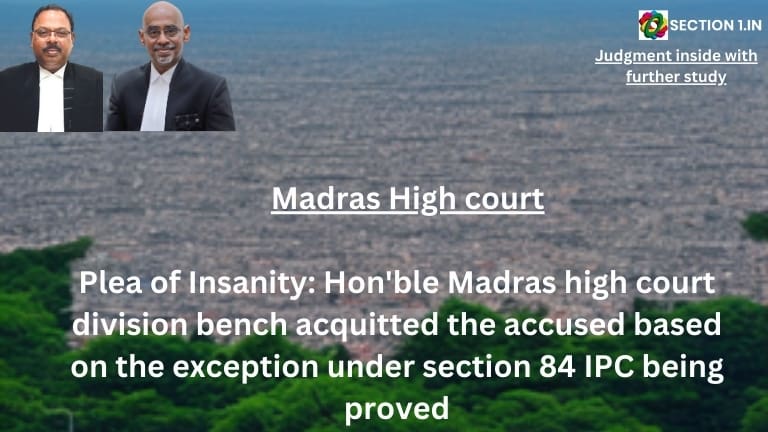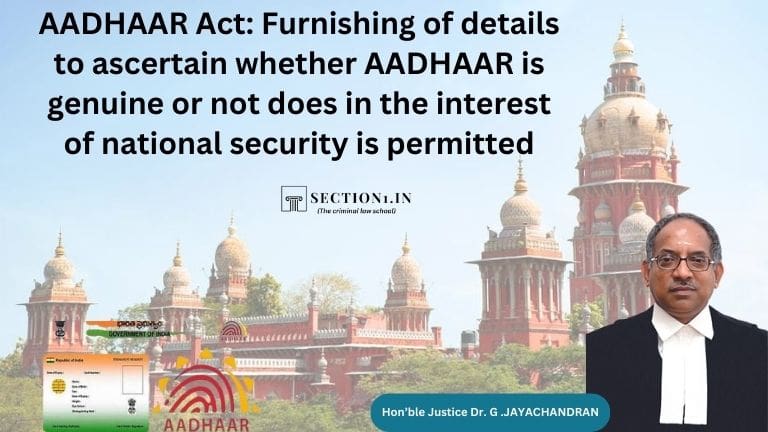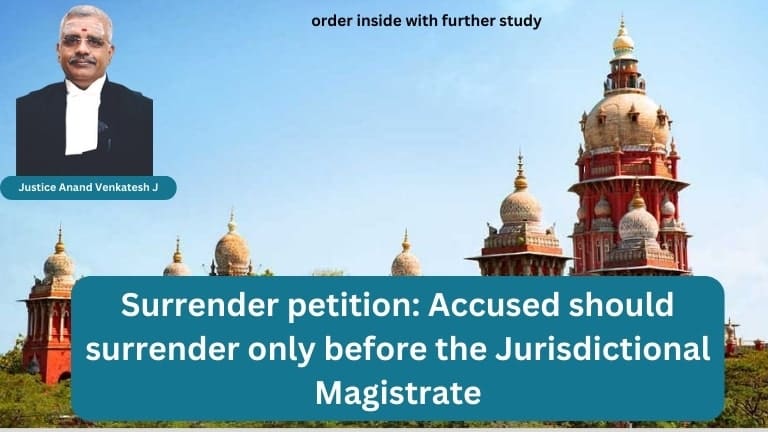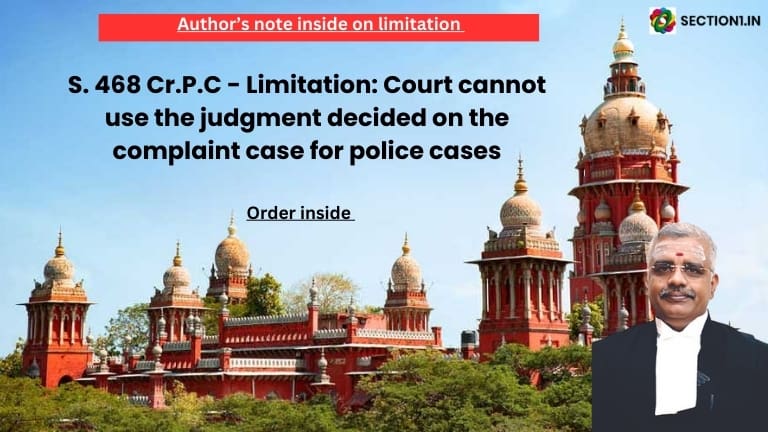Challenge & Prayer
Criminal Appeal filed under Section 374(2) of the Code of Criminal Procedure, to call for the entire records connected to the judgment in S.C.No.115 of 2015 on the file of the II Additional District Sessions Judge, Thoothukudi dated 23.06.2016 and set aside the conviction and sentence imposed against the appellant.
This Criminal Appeal arises out of the judgment of Conviction and Sentence rendered by the learned II Additional District Sessions Judge, Thoothukudi in S.C.No.115 of 2015, dated 23.06.2016.
2.On conclusion of trial in S.C.No.115 of 2015, the learned trial Judge found the appellant guilty and convicted her for the offence under Section 302 of IPC and sentenced her to undergo life imprisonment and to pay a fine of Rs. 1,000/-, in default, to undergo one year simple imprisonment.
Facts
3.The facts leading to filing of this appeal and necessary for its disposal, are as follows:
3.1.The deceased Kameswaran, aged about eight years, was done to death by the appellant, who was a spinster, by dousing kerosene on him and setting him on fire. The appellant is the sister of Kameswaran’s mother and daughter of PW2. At the time of occurrence, the deceased Kameswaran was studying in 3rd Std at Hindu Primary School, Keeranur Village, Aathoor Taluk, Thoothukudi District which is closer to his maternal grandmother’s/PW2 house. The deceased Kameswaran was living with his parents/PW1 & PW5 about a few streets away from PW2’s house. Since the maternal grandmother’s house was closer to the school, the deceased Kameswaran used to visit his grandmother/PW2 during lunch hours and after school hours to have snacks and refreshment and spend time with them.
Appellant is a mentally deranged person affected with paranoid schizophrenia and set the deceased on fire
3.2.On 12.09.2014, at about 01.20 p.m., when the deceased Kameswaran had gone to PW2’s house, there was a small wordy quarrel between the deceased Kameswaran and his Aunt/appellant, who was present there. The appellant being a mentally deranged person and affected with paranoid schizophrenia, bolted the house from inside, doused kerosene on Kameswaran and set him on fire. After seeing the smoke emanating from the house, the neighbours had informed Rajammal/PW2 about the same. PW2 along with others had broke open the door and went to find the deceased Kameswaran in a charred condition on the floor, while the appellant was sitting motionless beside him. When PW2 had informed her daughter/PW1, the mother of Kameswaren about the incident, PW1 had went there and took his son Kamaeswaran to the hospital in an ambulance driven by PW7.
Death of deceased at hospital
3.3.PW8/Casualty Doctor had examined the injured Kameswaran and after issuing the Accident Register (Ex.P4), admitted him as an inpatient (Ex.P5). At that time, Kameswaran was conscious, but was unable to speak. Thereafter, PW9, Burns Ward Doctor had examined Kameswaran and declared him as dead. Accordingly, he had issued death certificate (Ex.P6) to that effect. The death information was then informed to the respondent Police. PW14/Sub Inspector of Police, on receiving the information, reached the hospital and recorded the statement of PW1/mother of the deceased, in the presence of PW11. An FIR (Ex.P10) in Crime No.229 of 2014 for the offence under Section 302 IPC was registered. Thereafter, PW15/Investigating Officer had visited the scene of occurrence, prepared the Observation Mahazar (Ex.P11) and the Rough Sketch (Ex.P12), in the presence of PW6 and another. PW15 had then examined the witnesses viz., PW1/mother of the deceased, PW2/grandmother of the deceased, PW3 & PW4/neighbours, PW5/father of the deceased, PW7/Ambulance Driver, PW8/Casualty Doctor and PW9/Burns Ward Doctor. Subsequently, he had conducted inquest on the body of the deceased Kameswaran and sent it for postmortem. PW10/Doctor had conducted postmortem on the body of the deceased and issued the postmortem certificate (Ex.P8), confirming that the death was due to burn injuries. After collecting reports and other materials, the charge sheet was filed before the trial Court.
Trial & conviction
3.4.During trial, fifteen witnesses were examined as PW1 to PW15 and twelve documents were marked as Exs.P1 to P12 and two Material Objects were marked as MO1 & MO2 on the side of the prosecution. On the side of the defence, no witnesses were examined nor any documents were marked. On conclusion of trial, the trial Court rendered a judgment of conviction as stated above.
4.8.The learned counsel for the appellant had produced the Court communications regarding medical treatment and health condition of the appellant and the communication sent to the Psychiatry, Government Medical College, Trichy, Superintendent of Special Prison (Women), Trichy, letter from the Doctors attached to the Government Hospital, Trichy, Superintendent of Central Prison, Madurai, Medical advice from the Government Rajaji Hospital, Madurai and from the Institute of Medical Health, Kilpauk, Chennai confirming the mental state of the appellant. These medical reports of the Doctors, confirm the appellant to have had mental disorder during the under trial period, as well as after her conviction.
4.9. In support of his submissions, the learned counsel for the appellant relied upon the following decisions.
● Zakir Hussain Versus The State of Assam and another, Rep., by the P.P., Assam in Crl.A.376/2019.
● Sumitra Bai Versus The State of Chhattisgarh reported in 2023 LiveLaw (SC) 322.
● Prakash Nayi @ Sen Versus State of Goa reported in 2023 LiveLaw (SC) 71 wherein the Hon’ble Apex Court referring to various judgments in details had discussed the circumstances under which Section 84 IPC and Section 105 of the Indian Evidence Act to be invoked and also discussed the condition of schizophrenia patient in detail and finally allowed the appeal finding that the appellant therein was entitled the benefit conferred under Section 84 IPC.
● Reji Thomas @ Vayalar Versus State of Kerala in Crl.A.No.43 of 2023 wherein the final report has been filed concealing the fact of mental illness of the accused and thereby, the accused is entitled to benefit under Section 84 IPC.
● Madhu Bala Versus State reported in 2023 SCC OnLine Del 3661 wherein it is extracted the meaning of symptoms and varieties of schizophrenia and medical records.
Evidence substantiates the appellant was affected with paranoid schizophrenia
4.10.In view of the above, the appellant was affected with paranoid schizophrenia prior to the occurrence, during the occurrence and after the occurrence which is substantiated from the evidences of PW1, PW2, PW15 and the medical reports of the Doctors attached to the Prison, Trichy Medical College Hospital and Institute of Medical Health, Kilpauk, Chennai.
Analysis of Hon’ble Madras High court
6.This Court has considered the rival submissions and perused the materials available on record, as well as the medical records of the appellant.
7.In this case, the death of Kameswaran, who was aged about eight years, was due to burn injuries and the same is confirmed from the evidence of PW8, PW9 and PW10. The appellant and the minor Kameswaran were inside the house of PW2 on 12.09.2014, at about 01.30 p.m. The house was bolted from inside and then the appellant had doused kerosene and set fire on him. His body was charred and the same was confirmed through the evidences of PW1, PW2, who are the mother and grandmother of Kameswaran and elder sister and mother of the appellant. From the scene of occurrence, a kerosene can (MO1) and match box (MO2) were seized in the presence of PW6 and the same was recorded in Exs.P2 & P3. Immediately, after the occurrence, the charred Kameswaran was rushed to the hospital in the ambulance of PW7 accompanied by PW1, PW2 and PW11. In the meanwhile, PW1 had informed her husband/PW5, father of the deceased about the incident, who was working in Sayalkudi and who had reached the hospital in his two-wheeler. PW8/Casualty Doctor had examined him and recorded the 100% burn injuries through Ex.P4 and admitted Kameswaran in the Burns Ward. PW9/Burns Ward Doctor had also examined him and declared him dead at 04.15 p.m., in his death intimation report (Ex.P5).
Witnesses proved that the appellant and kameswaran were in the house locked inside
8.Thus, it is stands substantiated that the appellant and Kameswaran were inside the house on 12.09.2014, at about 01.30 p.m.; the house was locked from inside and the door was broke open; from there the boy was taken to Government Hospital, Thoothukudi and the same was confirmed by PW1, PW2, PW5, PW7, PW8, PW9 and PW11; in presence of PW6, MO1 & MO2 were seized; the inquest report Ex.P12 was prepared; PW10 had conducted postmortem and confirmed the death of Kameswaran due to burn injuries; and all the three Doctors had found the boy to have been with 100% burn injuries.
Offence proved so also the mental disorder of the accused
9.Thus, the chain of events are so complete, unerringly leading to conclusion that the appellant had committed the offence. Now, the only ground to be considered is whether the appellant was affected with mental disorder prior to occurrence, during the occurrence and after the occurrence. In this case, from the evidence of PW1, PW2/sister and mother of the appellant, it is found that for nearly ten years prior to occurrence, the appellant was suffering from mental disorder and she has been regularly taking treatment at Tirunelveli Government Medical College and Hospital.
Condition of the accused prior to the incident
10.PW2/mother of the appellant, who was residing along with the appellant had stated that eight days prior to the occurrence, the appellant was sleepless and in a disturbed condition and was also laughing on her own without reason. Since she was known to be suffering from mental illness, PW2 had not taken it seriously. On 12.09.2014, Kameswaran had come to the house of his grandmother at about 01.10 p.m. from his school, which fact is not disputed. At that time, the appellant had doused him with kerosene and set him on fire. When the neighbours had informed PW2 about smoke emanating from the house, she had rushed to the scene and tried to open the door, only to find the door bolted from inside. She had then broke open the door and entered the house and found charred condition of Kameswaran, which is substantiated from the evidences of PW1 & PW2. In the scene of occurrence, they had seen the appellant sitting beside the boy, without any action or reaction, further confirming that she was not in her normal sense and that she was mentally ill. Thereafter, the appellant was arrested on the same day and remanded to judicial custody.
Medical report of the Appellant shows that the psychiatric illness continues even after the conviction and in prison
11.From the date of remand, the appellant was found to be mentally deranged person and was referred to Government Hospital, Trichy. From then on, she has been taking regular taking treatment at Trichy, Madurai and Chennai. She is a diagnosed case of paranoid schizophrenia by the Institute of Mental Health, Kilpauk, Chennai on 27.09.2015. After conviction, she was confined in the Special Prison for Women, Trichy and in Special Prison for Women Madurai. She was regularly taking treatment, with follow up visits to Government Rajaji Hospital, Madurai. She was under strict vigil and observation by the prison authorities. Now, the appellant is in the aid and advice of Psychiatric and District Mental Health Doctor attached to Special Prison for Women, Madurai. Since the appellant’s condition was deteriorating, she was referred to the Institute of Mental Health, Kilpauk, Chennai in the year 2021 and treated as an inpatient. Thereafter, she was referred to Rajaji Hospital Madurai for continuous monitoring. She was also put under hemodyalysis treatment in Neprology Ward of the Government Rajaji Hospital Madurai. Even now, the appellant is suffering from sleep disturbances, anxiousness, sudden outbursts, irrelevant talks with violent and irrational behaviour. All these conducts confirm her psychiatric illness.
Hon’ble Supreme court’s judgment and application of the same in the present fact
13.The Hon’ble Apex Court in the case of “Prakash Nayi @ Sen Versus State of Goa reported in 2023 LiveLaw (SC) 71”, had relied on its earlier judgments and held that once a person’s unsoundness of mind is confirmed, then no offence is committed by such person as per Section 84 of IPC. Section 84 of IPC starts with a negative connotation that nothing is an offence which is done by a person of unsoundness mind and further, the Apex Court referred to Section 105 of Indian Evidence Act and by deliberating on the laudable object of Section 84 IPC, held that the Courts have their distinct role to play in cases of such nature. Of course, the materials produced on behalf of the person claiming unsoundness has to satisfy the conscience of the Court and had further detailed on schizophrenia mental illness, by referring to various medical journals. Thus, in sum and substance, the applicability of Section 84 of IPC and the consequent orders to be passed, have been elaborated therein.
Hon’ble Madras High court division bench has given benefit of section 84 IPC to the appellant
14.Taking cue from the same, we are satisfied that the appellant is a person who is entitled to the benefit of Section 84 of IPC.
Further direction for the treatment of the appellant
17.Finding that the appellant’s mental health condition is precarious and she is now without any assistance from her family, the appellant is ordered to be detained in safe custody, as per Section 335 Cr.P.C.
18.The appellant shall be given treatment at the Institute of Mental Health, Kilpauk, Chennai. If her mental health condition improves, she shall be kept in any of the Welfare Home for Women maintained by the Social Welfare Department, where she shall be under constant observation with periodical medical aid and review, until any of the family members or relatives file any application by giving security to the satisfaction of this Court and seeking for custody of the appellant. Any application if made before this Court, this Court may take a decision in this regard.
Parties
Petchiyammal … Appellant Vs State through The Inspector of Police, Aathoor Police Station, Thoothukudi District. (In Crime No.229 of 2014)-… Respondent – Crl.A(MD)No.275 of 2021 -RESERVED ON : 27.09.2023 PRONOUNCED ON : 24.01.2024 CORAM: THE HONOURABLE Mr.JUSTICE M.S.RAMESH and THE HONOURABLE Mr.JUSTICE M.NIRMAL KUMAR
https://mhc.tn.gov.in/judis/index.php/casestatus/viewpdf/924891
Petchiyammal vs. State – insanity
Further study
BURDEN OF PROOF [SECTION 106 EVIDENCE ACT] AND EXPLAINING CIRCUMSTANCE AND [SECTION 313 Cr.P.C]






